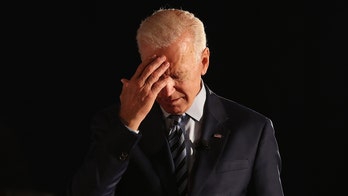Fox News Flash top headlines for August 18
Fox News Flash top headlines are here. Check out what's clicking on Foxnews.com.
Acting Homeland Security Secretary Chad Wolf said that while U.S. law enforcement saw instances of police abusing their power, it was inaccurate to say that policing as a whole was systemically racist.
His comments came during an Axios interview published Tuesday, in which journalist Mike Allen asked whether there was problem with systemic racism in American policing.
"Absolutely not," Wolf replied. "Do we have individuals in the law enforcement community that probably abuse their authority? We saw that in George Floyd’s death. But we see that around the country, absolutely, and they should be held accountable."
"But this idea that we have systemic racism is not accurate in my view," he added. He said the justice system "moved very quickly" in the Floyd case where each of the involved officers were arrested and charged with multiple offenses.
BARR SAYS HE DOESN'T BELIEVE THERE'S SYSTEMIC RACISM IN US POLICING
Floyd's death sparked nationwide Black Lives Matter protests and prompted calls to transfer police funds to social services. Wolf's department was involved in quelling some of the related protests in Portland, Ore. last month. Amid accusations of systemic racism, the Trump administration has repeatedly said that label doesn't apply to U.S. law enforcement.
“I don’t agree there’s systemic racism in the police department, generally, in this country,” Attorney General William Barr told Congress last month. In his opening statement, Barr said it was "understandable" that African Americans harbored distrust towards the police, and acknowledged perceptions of bias during police encounters.
"At the same time, I think it would be an oversimplification to treat the problem as rooted in some deep-seated racism generally infecting our police departments," he added.
JAMES CARAFANO: CANCEL CULTURE'S NEXT TARGET: DEFUNDING DEPARTMENT OF HOMELAND SECURITY
Barr's comments came as House Democrats passed policing reform legislation that has been painted as a way to address systemic racism. The Justice in Policing Act of 2020 includes coooperation from Barr's department, including in the creation of a task force overseeing law enforcement in the U.S.
After the bill's passage, Congressional Black Caucus Chair Karen Bass said: "For far too long, Black Americans have endured systemic racism and discrimination—especially from police. Congress may have written this bill, but the people own it."
Data compiled by The Washington Post reveals that Black people, who make up 13 percent of the U.S. population, accounted for 25 percent of those shot and killed by police since 2015; White people, accounting for 60 percent of the population, accounted for 45 percent of those killed by police officers.
But some have questioned that framing of the issue, pointing to the circumstances surrounding Floyd's death as well as crime rates in the Black community.
Heather Mac Donald, a scholar at the right-leaning Manhattan Institute, has pushed back on the idea of systemic racism. In a Wall Street Journal op-ed from June, she wrote: "A solid body of evidence finds no structural bias in the criminal-justice system with regard to arrests, prosecution or sentencing. Crime and suspect behavior, not race, determine most police actions."
CLICK HERE TO GET THE FOX NEWS APP
She cited an August 2019 study from the Proceedings of the National Academy of Sciences. "We find no evidence of anti-Black or anti-Hispanic disparities across shootings," the authors concluded, "and White officers are not more likely to shoot minority civilians than non-White officers. Instead, race-specific crime strongly predicts civilian race. This suggests that increasing diversity among officers by itself is unlikely to reduce racial disparity in police shootings."
Regardless, the issue will likely play a substantial role in the election. Former Vice President Joe Biden has already campaigned on the issue, releasing a plan to deal with systemic racism in a variety of areas. His website reads: "He will be unflinching in confronting the systemic racism in our country that is built into our laws, our policies, and our institutions and will take aggressive action to correct them—ripping out the inequities in housing, health care, education, the economy, our criminal justice system, and so many other areas."





